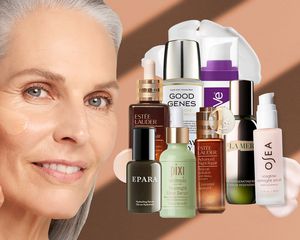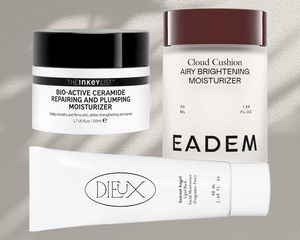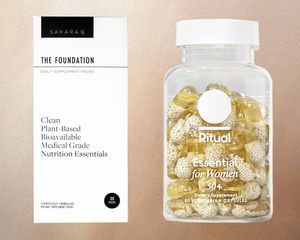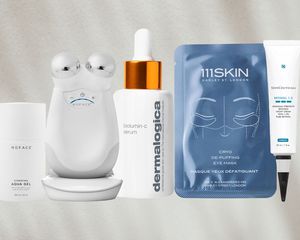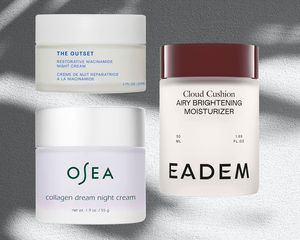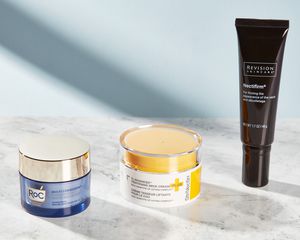:max_bytes(150000):strip_icc()/skincareimage1-dc9173240d1d40fbb60a0c23c54ae002.jpg)
Getty Images/LanaStock
We were just getting used to putting probiotics (like kombucha and kimchi) in our bodies when topical probiotic ingredients came along. Using fermented oils and other probiotic ingredients in skincare is a fast-growing trend. As someone who appreciates what fermented foods and drinks do for our digestive systems and immunity, I wanted to know all about the benefits they provide when applied to our skin, so I turned to the experts.
Layers founder Rachel Behm and founder of Humanist Beauty Jennifer Norman both use fermented ingredients in their products. Ahead, they to breakdown the functions of fermented oils in skincare. Read on to learn why your beauty products might be better if they are fermented.
What "Fermented Oil" Means
I was familiar with fermented food items, but the idea of aging oil was new to me. Usually, oil that isn't fresh or has been altered is considered a bad thing. Despite any preconceived notions you might have about intentionally aging oil, it can be a great thing.
"When a product's label says 'fermented oil,' it means the product contains an oil that has undergone the process of having a specialized microorganism introduced in an anaerobic environment (without oxygen,)" Norman explains. This process converts the carbohydrates in the original oil to acid plus energy.
Is Fermented Ingredients In Skincare a New Thing?
Consuming probiotics has been popular in indigenous cultures for ages, but it only reached the cultural mainstream in the West over the past few decades. Is the same true for skincare? Have people been fermenting their oils for ages, and we're just now catching on? Not so much.
Fermenting oil for topical beauty is a newer ideal. "More research has been done to determine the benefits of topically applying fermented ingredients," Norman says. "While the process of fermentation is quite ancient, the discovery of topically-applied skin benefits has only more recently been studied."
Behm believes that the fermented skincare trend is growing due to a desire to boost skin with non-irritating ingredients. "People realize it's better to boost our skin's amazing natural ability to renew rather than overprocess it with irritating chemicals and devices that may cause damage," she says. "Potent supplements and topicals are developed by experts and fuel the gut–skin connection to reveal dramatically renewed skin that glows from the inside out. Lactobacillus ferment plays a critical role in amazing skin results, without irritating."
The Benefits of Fermentation in Skincare
There are numerous benefits to applying fermented ingredients as there is ingesting them. Before delving into those, though, there is one major caveat to acknowledge. "Consumers should be aware that just because a product says it contains fermented oils, it doesn't mean that the product will deliver benefits," Norman notes. "I always recommend that consumers dig deeper to learn about the actual fermented ingredients and if they have clinical tests showing skin benefits."
Norman suggests researching ingredients to see if formulations include clinically-tested safe doses. "The best way to identify and confirm skin benefits is through reliable scientific testing of that specific fermented material in a certain dose on human skin," she adds.
When a brand uses effective dosages of ferments in its ingredients, benefits might include:
- Boosting ingredient penetration into the skin
- Increasing concentration: Behm says, "the fermentation process can help concentrate an ingredient so it can deliver benefits within one drop or pump of formula."
- Prolonged moisturizing effects
- Increased antioxidant activity
- Improved skin texture: Norman says that ferments can "deliver a silkier skin feel with less greasiness."
The Science Backing The Claims
While there's room for a lot more research on the benefits and effects of fermented skincare, some journals on the subject have been published, backing its beneficial nature. A 2018 study notes that probiotic extracts can help with photo-aging, also known as sun damage. Another study concluded that fermented red ginseng increased anti-wrinkle efficacy and reduced toxicological potency compared to no-fermented red ginseng.
In a 2020 study, researchers found higher biodiversity in the skin after four weeks of treatment with a topical fermented oil. "Higher biodiversity reflects in a healthier microbial ecosystem since microbial diversity decreases in the presence of a disease or due to aging," the study reads. Research also found the treatment resulted in a more "beneficial" and "younger" microbial community after treatment with fermented oils.
How Fermented Oil Can Change a Product Overall
The formulation of fermented products relies on the ingredients being at the proper dosage and created with specific skin functions in mind. Both Norman and Behm use entirely different fermented ingredients for different reasons.
Norman tells me that two medicinal fermented oil complexes were formulated into Humanist's Herban Wisdom Facial Oil at adequate levels. The ferments, called Fermentoil Glycyrrhiza and Fermentoil Shiunko, were developed by a Korean biotech firm called Labio. "Both fermented oils are created by introducing natural plant oils to a yeast microorganism called Pseudozyma," Norman explains. "The Pseudozyma breaks the triglycerides and fatty acids into glycerol plus free fatty acids with mannosylerythritol lipids (MELs) as byproducts. This fermentation process serves to increase the amount of free fatty acids, MELs, and active antioxidants versus the original plant oils."
Behm says her brand Layers brand uses lactobacillus ferment. It's a bacteria strain found on the skin and known for its anti-inflammatory and antimicrobial properties. "We use a novel processing technology that preserves the structure of the bacteria's cell wall, so it holds onto its beneficial components while making it safe for use in topical formulas," Behm says. "We also include this active ingredient at levels clinically proven to boost skin's natural defenses for a strengthened skin barrier and preserve the natural microbiome."
The Final Verdict
Fermented oils may have gained traction due to the rise in consumption of fermented foods, but I'm confident we'll see more of them in skincare as research evolves. While some ingredients and processes have been proven to boost skin moisture and texture, it's essential to research as new products hit the market. After all, effectiveness depends on the producer's integrity and ability to use the proper amounts of each ingredient. Still, if you're curious about incorporating fermented science, there are safe options from brands like Humanist and Layers, that might be the missing product your skin needs.
